Bruton Tyrosine Kinase-Dependent Immune Cell Cross-talk Drives Pancreas Cancer
- PMID: 26715645
- PMCID: PMC4783268
- DOI: 10.1158/2159-8290.CD-15-0827
Bruton Tyrosine Kinase-Dependent Immune Cell Cross-talk Drives Pancreas Cancer
Erratum in
-
Correction: Bruton Tyrosine Kinase-Dependent Immune Cell Cross-talk Drives Pancreas Cancer.Cancer Discov. 2016 Jul;6(7):802. doi: 10.1158/2159-8290.CD-16-0626. Epub 2016 Jun 13. Cancer Discov. 2016. PMID: 27297551 No abstract available.
Abstract
Pancreas ductal adenocarcinoma (PDAC) has one of the worst 5-year survival rates of all solid tumors, and thus new treatment strategies are urgently needed. Here, we report that targeting Bruton tyrosine kinase (BTK), a key B-cell and macrophage kinase, restores T cell-dependent antitumor immune responses, thereby inhibiting PDAC growth and improving responsiveness to standard-of-care chemotherapy. We report that PDAC tumor growth depends on cross-talk between B cells and FcRγ(+) tumor-associated macrophages, resulting in T(H)2-type macrophage programming via BTK activation in a PI3Kγ-dependent manner. Treatment of PDAC-bearing mice with the BTK inhibitor PCI32765 (ibrutinib) or by PI3Kγ inhibition reprogrammed macrophages toward a T(H)1 phenotype that fostered CD8(+) T-cell cytotoxicity, and suppressed PDAC growth, indicating that BTK signaling mediates PDAC immunosuppression. These data indicate that pharmacologic inhibition of BTK in PDAC can reactivate adaptive immune responses, presenting a new therapeutic modality for this devastating tumor type.
Significance: We report that BTK regulates B-cell and macrophage-mediated T-cell suppression in pancreas adenocarcinomas. Inhibition of BTK with the FDA-approved inhibitor ibrutinib restores T cell-dependent antitumor immune responses to inhibit PDAC growth and improves responsiveness to chemotherapy, presenting a new therapeutic modality for pancreas cancer.
©2015 American Association for Cancer Research.
Conflict of interest statement
Figures
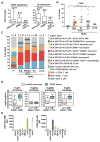
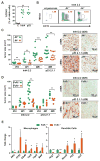
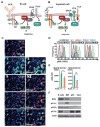
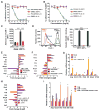
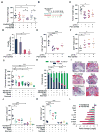
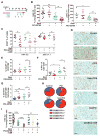
Comment in
-
B Cells Promote Pancreatic Tumorigenesis.Cancer Discov. 2016 Mar;6(3):230-2. doi: 10.1158/2159-8290.CD-16-0100. Cancer Discov. 2016. PMID: 26951836
References
-
- Hanahan D, Coussens LM. Accessories to the crime: functions of cells recruited to the tumor microenvironment. Cancer Cell. 2012;21:309–22. - PubMed
-
- SEER.cancer.gov [Internet] Rockville: National Cancer Institute; c2015. Available from: http://seer.cancer.gov/statfacts/html/pancreas.html.
-
- Siegel R, Naishadham D, Jemal A. Cancer statistics, 2012. CA Cancer J Clin. 2012;62:10–29. - PubMed
Publication types
MeSH terms
Substances
Grants and funding
- T32 CA121938/CA/NCI NIH HHS/United States
- R01 CA126820/CA/NCI NIH HHS/United States
- T32HL098062/HL/NHLBI NIH HHS/United States
- T32 HL098062/HL/NHLBI NIH HHS/United States
- R01 CA155331/CA/NCI NIH HHS/United States
- R01CA140943/CA/NCI NIH HHS/United States
- R01 CA167426/CA/NCI NIH HHS/United States
- R01 CA130980/CA/NCI NIH HHS/United States
- U54 CA163123/CA/NCI NIH HHS/United States
- T32 AI078903/AI/NIAID NIH HHS/United States
- T32CA121938/CA/NCI NIH HHS/United States
- R01 CA083133/CA/NCI NIH HHS/United States
- R01CA167426-03S1/CA/NCI NIH HHS/United States
- R01CA130980/CA/NCI NIH HHS/United States
- R01CA126820/CA/NCI NIH HHS/United States
- R01CA083133/CA/NCI NIH HHS/United States
- R01CA167426/CA/NCI NIH HHS/United States
- T32CA009523/CA/NCI NIH HHS/United States
- R01 CA140943/CA/NCI NIH HHS/United States
- R01 CA098048/CA/NCI NIH HHS/United States
- U54CA163123/CA/NCI NIH HHS/United States
- T32AI078903-04/AI/NIAID NIH HHS/United States
- R01CA15531/CA/NCI NIH HHS/United States
- T32 CA009523/CA/NCI NIH HHS/United States
LinkOut - more resources
Full Text Sources
Other Literature Sources
Medical
Research Materials

